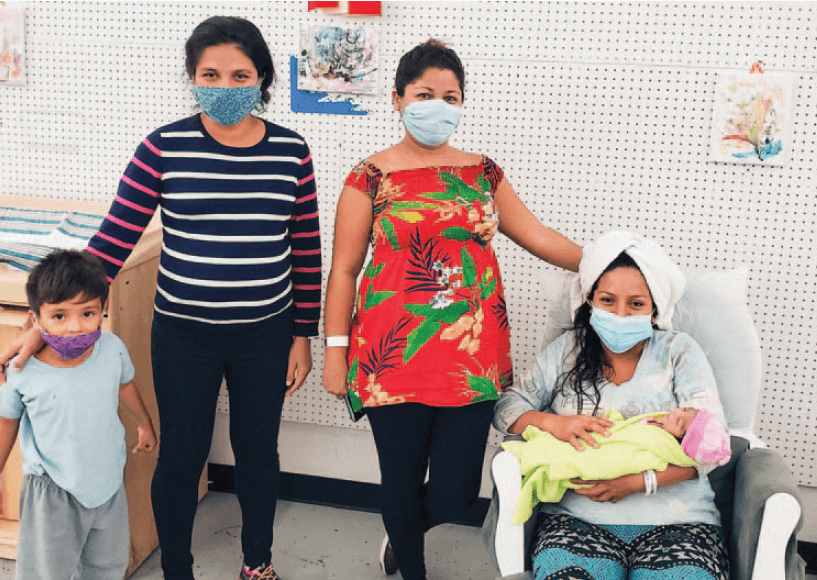
In July 2024, Helen,* an 11-year-old female immigrant from Eritrea was seen at a hospital in a Southwest state. There, she was diagnosed with cerebral palsy, malnutrition, and vitamin D deficiency. The family intended to move northward to a Midwest state where members of her immediate family lived, so the patient’s pediatrician enrolled her in Specialty Care Access Network (SCAN), a Migrant Clinicians Network program that combines Health Network, our continuity of care program, with a network of volunteer clinicians and advocates, to expand specialty care access to children who encounter significant barriers to accessing such care because they are leaving a service area.
After enrollment, the first step is for the Health Network Associate who supports SCAN, Elizabeth Gonzalez Ibarra, to directly contact the patient’s family to confirm contact information and the address to which the family planned to move. “Typically, we use the translation line, and from the main menu, it says, ‘If you need Spanish, press one. If you need another language, press 2…’ Then, they go find an interpreter. Usually, it’s within seconds that we connect to a translator… but I needed someone who speaks Tigrinya,” explained Gonzalez Ibarra. Tigrinya is the most widely spoken language in Eritrea, with about half of the country’s population speaking it as their first language, but interpretation was still difficult to secure.
“It took a few minutes to find someone who speaks the language – but then I ended up losing the interpreter. Something went wrong with the signal, and we had to go through the process a second time,” recalled Gonzalez Ibarra. “It was taking a long while” to connect to a second interpreter, she said, and during that wait, the patient’s uncle, who speaks English, offered to interpret in the absence of an official interpreter. Because the initial call was just an introductory call to offer the program’s services and confirm contact details, Gonzalez Ibarra chose to continue with the uncle’s interpretation.
“I explained how Health Network works, and I got their address,” she recalled. After the call, she looked for a SCAN Champion who lives in the Midwest state to where the patient and her family was moving. SCAN Champions are general practitioners or specialists with working relationships with specialists in their communities and beyond. They volunteer their time, expertise, and networks to supporting children with specialty care needs who are moving. The SCAN Champion that she found connected Gonzalez Ibarra with a colleague, a physician who works at a community health center nearby. Gonzalez Ibarra explained the patient’s expected extensive care needs -- appointments in pediatrics, GI, rehabilitation and physical therapy, speech therapy, sleep study, and occupational therapy – to this clinician.
“She was quick to say ‘yes, we can take her in, just call the scheduling team,’” which Gonzalez Ibarra immediately did. “Everything flowed really well. [The health center staff] were patient and understanding. The patient speaks a different language and yet they were very fast in getting her to an appointment and helping them getting scheduled,” Gonzalez Ibarra said. The health center also enrolled the family into programs for which they are eligible, including transportation assistance. For the patient’s first appointment, Gonzalez Ibarra arranged for an Uber through Health Network’s partnership with the Uber Foundation, but the health center arranged for future transportation vouchers to her many appointments, removing one of the significant barriers that many patients face.
Gonzalez Ibarra regularly followed up with the patient’s family after the patient’s initial appointment to ensure that they were able to schedule and attend all the appointments she needed, but after connection with the health center, the patient’s family needed no additional assistance. “This case was a really quick – the family was attended to amazingly, and things ran smoothly, so I closed the case.”
“Connecting patients to local health centers is important especially for displaced people who are moving, who often have the most difficulty getting the care they need,” said Laszlo Madaras, MD, MPH, Chief Medical Officer of Migrant Clinicians Network. “Often, these patients are from agricultural worker families who need to be on the move to wherever they are needed. Mobility is just one of many barriers that agricultural workers face, and our Health Network Associates work hard to remove such barriers. This is especially true for our SCAN program which often has a critical time component as we often deal with very sick children."
“Our work here at Health Network is so impactful not only for families but also for community health centers and other organization that work with us,” emphasized Gonzalez Ibarra. “If it weren't for our partners, from health centers to SCAN Champions, we would not be doing this amazing, important work. Thank you. Please join us to continue this great work.”
*Name and certain identifying details have been changed or anonymized to protect the patient’s identity.
